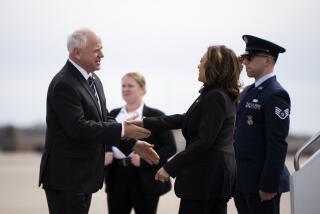A disastrous pick for Labor secretary
AFL-CIO President John Sweeney said he’s “thrilled.” SEIU President Andy Stern said he’s “thrilled.” Apparently, everyone who happens to run a labor organization feels that Christmas has come a little early this year with President-elect Barack Obama’s choice of Rep. Hilda L. Solis (D- El Monte) for secretary of Labor. In his Dec. 19 Times Op-Ed article, “Labor’s fresh face,” Harold Meyerson praises what he considers the numerous gutsy political moves made by Solis over her career.
The reason for their palpable giddiness, however, is likely to trouble anyone who doesn’t happen to run a union.
Solis regularly sides with organized labor’s demands, including the biggest of them all: union leaders’ desperate campaign to boost their membership by getting rid of secret ballot elections. That privacy allows millions of American workers to vote their conscience when deciding whether to start paying dues to a union boss. Consequently, it’s easy to see why union bosses prefer “card check” -- a dubious method that requires employees to sign a legally binding card stating their preference in a way that would allow anyone to know if they are pro-union or not.
The fight over card check has already been a precarious affair. And this week, with the announcement of Obama’s pick of Solis, the situation got even stickier. Solis has a hypocritical history of demanding secret ballots for herself but not for working Americans.
During her tenure on Capitol Hill, Solis co-sponsored the controversial and grossly misnamed Employee Free Choice Act (EFCA), legislation that would effectively kill the right to a secret ballot election for employees deciding whether to join a union. The right to cast a vote in private is a cornerstone of elections in America. And that iconic voting booth plays a vital role in the U.S. workplace too, ensuring that employees remain free from coercion from either unions or employers during organizing drives.
But the passage of EFCA would radically change that. The bill would rip back the curtain, exposing an estimated 100 million employees to harassment and intimidation -- not just by unions, but also by bad bosses and busybody co-workers.
While Solis now believes that card check is good enough for all those workers, she took a very different stance last year when her own right to a secret ballot was at stake. On Jan. 5, 2007, Solis co-signed a letter criticizing the absence of secret ballot elections in the leadership selection of the Congressional Hispanic Caucus.
Solis wrote, “Votes by secret ballot were in order but never taken. We therefore believe that we need to follow proper rules of procedure and hold a vote by secret ballot.” She continued, “It is important that the integrity of the CHC be unquestioned and above reproach.” There’s no way to spin it. It’s a textbook example of hypocrisy, and one that may soon make its way into the law books as well.
Still, Solis cannot be singled out for this brazenness. All of her congressional colleagues who support EFCA are all too happy to accept the secret ballot votes of constituents when running for reelection. Moreover, many of these fine civil servants -- including a few others from the Golden State -- seem eager to acknowledge their hypocrisy in writing.
Rep. George Miller (D-Martinez) heads the House committee responsible for drafting the EFCA. But in August 2001, he wrote a letter along with several fellow Democrats to Mexican labor officials to “encourage” them to “use the secret ballot in all union recognition elections.” For anyone who might miss the point, the letter spelled it out even further: “We feel that the secret ballot is absolutely necessary in order to ensure that workers are not intimidated into voting for a union they might not otherwise choose.”
In state politics, things aren’t much different. Times reporters have documented the about-face on the issue of secret ballots by the leadership of the United Farm Workers. The Times has quoted former UFW volunteer and activist Don Villarejo as saying, “The UFW contended that the secret ballot was the only way people could be protected from intimidation by outsiders. You have to scratch your head and say, ‘What’s going on?’ ”
That’s a good question. Here’s another: Why do California politicians, including Solis, support ending secret ballots for working Americans when the record is clear on the need to protect workers? That is a troubling but important question that she should face before she gets to be the nation’s top cop for protecting workers. Union bosses may be “thrilled” with her answer, but the rest of us probably won’t be.
Bret Jacobson is founder and president of Maverick Strategies LLC, a research and communications firm serving business and free-market think tanks.
More to Read
Get the L.A. Times Politics newsletter
Deeply reported insights into legislation, politics and policy from Sacramento, Washington and beyond. In your inbox three times per week.
You may occasionally receive promotional content from the Los Angeles Times.










